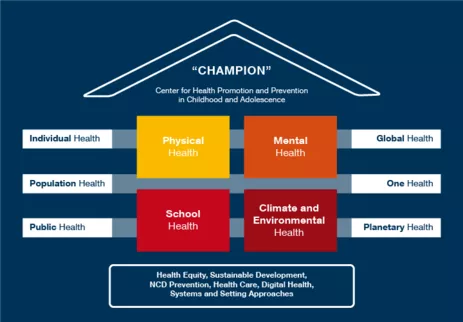The TUM Center for Health Promotion and Prevention in Childhood and Adolescence (CHAMPION) was established in October 2022 under the patronage of the Bavarian Minister of Health. The inaugural ceremony was held at TUM`s new campus in the Olympic Park during the International Summit on Child Health and Well-being. As early as 2020, members of the Department Health and Sport Sciences jointly started to draft the CHAMPION concept in collaboration with members of the TUM Department of Medicine, TUM School of Life Sciences, and affiliated stakeholders.
Research at CHAMPION is rooted in the social model of health, addressing health promotion and disease prevention from an interdisciplinary perspective. Research at CHAMPION is concerned with the entire environment affecting child and adolescent health and well-being, and will also focus on addressing health equity, the determinants of health, and the root causes of health inequalities. The CHAMPION research framework includes investigating health resources to promote health (asset-based perspective to health) and risk factors to prevent diseases (risk-based perspective to health), and takes into account contemporary issues in child and adolescent health.
Research at CHAMPION benefits highly from the combined public health and biomedical research excellence and expertise in the new TUM School of Medicine and Health. CHAMPION also facilitates synergies to other TUM Schools relevant to child and adolescent health, such as the TUM School of Life Sciences, School of Social Sciences and School Technology, Natural Science, and Computation, Information and Technology as well as the TUM Integrative and Corporate Research Centers. Collaboration across Schools, Departments, and Research Centers enables drawing from diverse research topics, disciplines, and methodologies relevant to children and adolescents’ health development over the life-course, including health promotion, disease prevention, healthcare, education and sustainable development. These features and their combination make CHAMPION unique compared to other academic research centres and networks in Europe and beyond that mostly focus on biomedical, curative, and risk-based research approaches.
Informed by the underlying research framework, CHAMPION includes a cross-sectoral approach in cooperation with actors from practice and policy. CHAMPION will generate up-to-date evidence on various dimensions of health promotion and prevention in relation to children and adolescents and actively contribute to European capacity building in child and adolescent public health and medicine.
The main goals of CHAMPION are to
- Conduct innovative research projects, including basic and applied science
- Facilitate research training of early career researchers and PhD students
- Enable child and adolescent health promotion and prevention topics in the School`s graduate and undergraduate teaching and study programs
CHAMPION is based on a cluster structure with four focus topics rooted in child and adolescent health promotion: (1) physical health, (2) mental health, (3) school health and (4) climate and environmental health. Research in these clusters investigate contemporary health promotion and prevention issues, taking into account the various determinants of health (social, cultural, political, cultural, digital, commercial), participatory approaches, empowerment, diversity and gender issues, inclusion, and professionals working with children and adolescents. Research projects focus on different areas of study including individual health, population health, public health, global health, one health, and planetary health. These areas represent crosscutting topics within CHAMPION, also framed by core 21st century mega trends in health: health equity, sustainable development, NCDs, health care, digital health, healthy lifestyles, and systems approaches (see figure above).
More than 40 professors and their scientific staff from different schools at TUM and other academic and non-academic institutions are involved in CHAMPION and contribute to the research clusters. Prospectively, the clusters will conduct research in their predefined and expertise fields and together generate new knowledge in order to provide evidence to inform intervention and policy development. CHAMPION will act locally, regionally, and internationally and collaborate with actors from research, practice and policy from a variety of backgrounds and fields. In this context, CHAMPION actively seeks partnerships and collaboration with regional, local and international partners. In 2022, CHAMPION officially launched a partnership with the UNESCO Global Chair Health and Education, which is in Paris, France, and both partners will collaborate on new European and global projects on child and adolescent health promotion and prevention.
CHAMPION will be fully integrated into the new TUM School of Medicine and Health in October 2023, leading research and teaching on all matters related to child and adolescent health promotion and prevention.
